Lack of monetary value for the domestic chores that women do, early marriage, and lack of
education are some of the factors that give abusive men the edge against their female
companions. ADETUTU SOBOWALE tells the stories of trauma, hardship, and criticisms suffered by women who depend solely on their husbands.
For two years, 23-year-old Esther Atidade has been experiencing severe abuse from her husband.
She goes to bed with the expectation that her husband will stop the torture someday and wakes
up regretting her decision to marry.
Esther is a slim, tall, and dark complexion lady with gap teeth. She had wanted to be a chartered
accountant, but early marriage shattered her dream.
She was expecting admission into the university when her then boyfriend, Olufemi Atidade, got
her pregnant in August 2020.
Esther is now a housewife with a two-year-old kid. She depends fully on her husband because
she has no employable skill or money to start trading. The abuse she endured could be due to any
reason, including her inability to prepare food for the family on some occasions.
She tells her story, “I was expecting admission into the university around August 2020 when he
got me pregnant. It was a bad experience for me, but my parents refused to take me in. I didn’t
have any option than to move in with him.
“At first, he was loving; but after about three months, he started giving me some attitude that I
did not like. I begged him to forgive me if I offended him, though I couldn’t think of any, but
that didn’t soften him. He would beat me, scold me, and abuse me whenever he arrived home
and didn’t meet already prepared food.”
Esther said her husband called her names because she had no job.
“We had a very serious fight, following which he told everybody that I was lazy and that I
preferred sleeping, eating, and watching movies to working. He called me names even in the
presence of his siblings who usually came to settle our dispute.” she said.
National unemployment rate
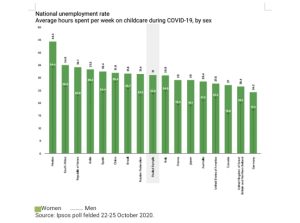
Though the unemployment rate in Nigeria is shared between men and women, available data
from the International Labor Organization shows that women take the higher percentage of the
unemployed people.
According to the ILO, 31,315 men were employed, while 25,535 women were employed in
2019. Again, 31,042 men were employed, while 25,535 women were employed in 2020; while
32,161 men were employed in 2021, as opposed to the 26,007 women in the same year.
In 2022, unemployment rate in Nigeria is estimated to have reached 33 percent, with the
unemployment rate for people aged 25 to 35 put at 37.2 percent.
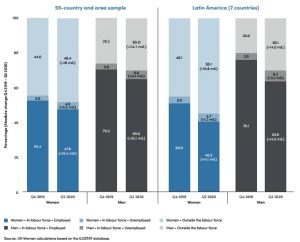
Apart from Esther, other unemployed housewives who spoke with this reporter also have bitter
tales of their experience to tell.
Home of torture
Blessing Oyatayo was two months pregnant when her husband started showing her all forms of
torture.
Blessing grew up in a broken home in Ayetoro area of Ogun State. Her parents had divorced
when she was 19, and she was adopted by her dad’s relation who lived in Lagos.
At 21, Blessing started hawking yam for her father’s sister around AIT Road in Alimosho Local
Government area of the state. After three years on the street hawking yam, she secured
employment as a bar attendant around the Ijaiye area.
It was while working at the bar that she discovered that she was pregnant. She later lost the bar
attendant job as her boss told her that the bar setting forbids a pregnant woman from attending to
customers.
She had to stay at home, and that set the stage for abuse by her husband who is now the sole
breadwinner.
She says, “It started when my employer stopped me from coming to work because of the
pregnancy. My pregnancy was about two months then and I have been at home since then.”
Her body, despite the pregnant, is riddled with injuries which she claimed to be the results of
beatings she gets from her husband.
Blessing, who is now close to her delivery date, said her husband, Yusuf, beats her any time,
whether in the day and at night.
“He beats me every time. Someone had told me that the drugs he is taking are affecting his brain.
There are many times that our neighbors will be begging him to leave me, even in the middle of the night, but he will not listen. He rains curses on me and blames me for his misfortune
whenever he is broke.” the traumatized woman claimed.
Blessing added that she goes hungry for days whenever her husband is not financially buoyant.
“There are many times I will not eat anything because I don’t have my own money. So, if he
doesn’t drop any money for me, I can’t buy food. And whenever he is broke, he will be
aggressive, such that slightest mistake might result into slaps for me.” the expectant woman said.
I have nowhere to go
She explained that she endured all the torture because she had nowhere to go.
“I do not have a choice, where do I want to go with pregnancy? There is nowhere to go. I am just
praying that I should deliver safely; once I have my baby, I can make a decision.” she said.
Perhaps unbeknownst to Esther and Blessing, they are both victims of gender-based violence, a
phenomenon that has been referred to as a “global pandemic” by the World Bank.
Types of gender-based violence

According to Safer Spaces, a South African-based nongovernmental organization, there are four
main types of violence. It notes that by looking more closely at the nature of acts of violence,
there are three categories of violence that can be further divided into four.
“More specific, types of violence include physical violence, sexual violence, psychological
violence and neglect,” Safe Spaces said.
The United Nations Entity for Gender Equality and the Empowerment of Women, also known as
UN Women, explains these in clear terms.
Domestic violence
Domestic violence, also called domestic abuse or intimate partner violence, is any pattern of
behavior that is used to gain or maintain power and control over an intimate partner. It
encompasses all physical, sexual, emotional, economic, and psychological actions or threats of
actions that influence another person. This is one of the most common forms of violence
experienced by women globally.
Domestic violence can include the following.
Economic violence
Economic violence involves making or attempting to make a person financially dependent by
maintaining total control over financial resources, withholding access to money, and/or
forbidding attendance at school or employment.
Psychological violence
Psychological violence involves causing fear by intimidation; threatening physical harm to self,
partner or children; destruction of pets and property; “mind games”; or forcing isolation from
friends, family, school and/or work.
Emotional violence
Emotional violence includes undermining a person’s sense of self-worth through constant
criticism; belittling one’s abilities; name-calling or other verbal abuse; damaging a partner’s
relationship with the children; or not letting a partner see friends and family.
Physical violence
Physical violence involves hurting or trying to hurt a partner by hitting, kicking, burning,
grabbing, pinching, shoving, slapping, hair-pulling, biting, denying medical care or forcing
alcohol and/or drug use, or using other physical force. It may include property damage.
Sexual violence
Sexual violence involves forcing a partner to take part in a sex act when the partner does not
consent.
A global pandemic
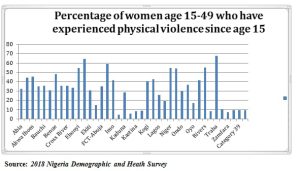
According to the World Bank, gender-based violence (GBV) or violence against women and
girls (VAWG), is a global pandemic that affects one in three women in their lifetime.
The numbers are staggering, says the Bank. It notes, “35% of women worldwide have
experienced either physical and/or sexual intimate partner violence or non-partner sexual
violence.
“Globally, seven percent of women have been sexually assaulted by someone other than a
partner.
“Globally, as many as 38% of murders of women are committed by an intimate partner, while
200 million women have experienced female genital mutilation/cutting.”
Gender-based violence and GDP
The Bank noted that the issue is not only devastating for survivors of violence and their families,
but also entails significant social and economic costs.
“In some countries, violence against women is estimated to cost countries up to 3.7% of their
GDP – more than double what most governments spend on education.
Failure to address this issue also entails a significant cost for the future, the Bank warns, citing
numerous studies that have shown that children growing up with violence are more likely to become survivors themselves or perpetrators of violence in the future.
Violation of human rights
The UN Women notes that violence against women and girls is one of the world’s most
prevalent human rights violations, taking place every day, many times over, in every corner of
the globe.
“It has serious short- and long-term physical, economic and psychological consequences on
women and girls, preventing their full and equal participation in society,” the UN agency warns;
adding that “The magnitude of its impact, both in the lives of individuals and families and
society, is immeasurable.”
Violence and your mental health

Anthony Ogbemudia, a psychiatrist at the Neuropsychiatric Hospital Aro, Abeokuta, Ogun State,
noted that violence can affect the victim’s mental health.
“It could result in problem drinking, sleep difficulties, eating disorders and suicide attempt
according to the World Health Organization (WHO). Violence against women could lead to
victims becoming withdrawn, suffer low self-esteem and, in severe cases, result in depression.’
Ogbemudia warned.
Indeed, the WHO estimated that globally, about one in three (30 percent) of women worldwide
has been subjected to either physical or sexual intimate partner violence or non-partner sexual
violence in their lifetime.
A domestic violence survivor, 29-year-old Helen Nwabueze, suffered mental health issues before
she woke up in the middle of the night sometime in December 2021 and started ruminating about
her marital life.
At that moment, Nwabueze decided to end her marriage due to the abuse she had experienced,
describing it as “beyond reason.”
Nwabueze got married to her husband in November 2019. Before her marriage, she had worked
as a POS attendant in Surulere area of Lagos State. But because her now estranged husband lived
in Abeokuta, the capital of Ogun State, she abandoned her job and relocated to her husband’s
base.
Nwabueze said the man had insisted that she would be a housewife for the first year of their
marriage, which she objected to.
“He told me that I would be a housewife in the first year of our marriage. I objected, but he
insisted. My friends and family members said I should accept his wish and continue praying for
him,” the woman said.
She explained that a few months after her marriage, her now estranged husband started to
physically abuse her whenever they had arguments.
“He cheated on me anyhow and whenever I complained, he beat me. He hit me many times,
bartered my face and body, and he once locked me outside the house and went away with the
key,” the beleaguered woman narrated.
“There was a time he pushed me outside when we were fighting. I was outside until 2 A.M, It
was a vigilante member who saw me outside at that ungodly hour that called him on the phone.
“He told the man to go ahead and lodge me in a hotel. They told him that it was impossible at
that time of the night, and he responded that they should do whatever they felt like to me. I was
heartbroken,” she said.
She claimed that her marital experience affected her mental health at some point, but she did not
seek medical help. Rather, she said, “People around advised me to just leave,” an admonition she heeded.
Housewives’ unpaid labor
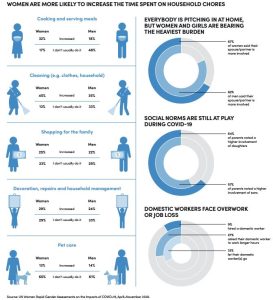
According to experts, there is a high rate of unemployment among women, and they consider
this as one of the major reasons why some male breadwinners believe they can treat their female
partners anyhow.
Yet, even when they are not engaged in economic activities outside the home, the women do
house chores ranging from cleaning, to washing dirty dishes, doing laundry, cooking for the
family, and taking care of the children.
If these women work outside the home, consequent upon which they may have to hire someone
to do the work, the unpaid work they do will become clear to everyone.
For instance, Blessing said that despite her pregnancy, she walks down the street to fetch water,
while she also does her husband’s laundry, and cook daily, among other back-breaking domestic
chores.
Speaking on the housewives’ unpaid labor, President of the Priceless Jewels Foundation (PJF), a
non-governmental organisation, Olajumoke Peters-Fadairo, advocated that women who do house
chores should be paid for the job.
Priceless Jewel Foundation is one of the non-governmental organisations advocating against
gender-based violence in Nigeria.
“I don’t think any woman is jobless. The reason is that the activities in the house are enough
work on their own. In some advanced countries, women who sit at home get paid because being
at home comes with so many responsibilities,” Peters-Fadairo said.
She notes that such jobs include, “Having to prepare meals, cleaning the house, washing clothes
and dishes, and doing school runs.
“In advanced countries, people are hired to do these things. So, if a woman is at home doing all
these, then she is not jobless. If she is not paid for it, she should be appreciated in one way or the
other. It is not for her to be abused by her husband, “Peters-Fadairo added.
The Organisation of Economic Cooperation and Development defines unpaid labor as “time
spent doing routine housework, shopping for necessary household goods, childcare, tending to
the elderly and other household or non-household members, and other unpaid activities related to
household maintenance.”
The OECD, however, laments that unpaid labour remains largely invisible to economists.
“It isn’t a part of G.D.P. calculations and rarely factors into other measures of economic growth.
“It is notoriously difficult to value because the normal market signals of supply and demand
don’t work, because traditional expectations that caring for children, the elderly and the infirm
should be done gratis within the family obscure the true economic value of this work.”
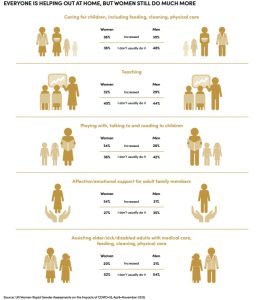
The International Monetary Fund (IMF) reports that, in general, as much as half of the world’s
work is unpaid. However, most of it is done by women, the international agency says.
“This imbalance not only robs women of economic opportunities. It is also costly to society in
the form of lower productivity and forgone economic growth. It follows that a fairer allocation of
unpaid work would not only benefit women but would also lead to more efficient work forces
and stronger economies.
“For these reasons, reducing gender imbalances in unpaid work is part of the United Nations
Sustainable Development Goals,” says the Fund.
Examples of unpaid work include cooking, cleaning, fetching food or water, and caring for
children and the elderly. These tasks are not counted as part of economic activity because they
are difficult to measure based on values in the marketplace. “Yet their economic value is
substantial, with estimates ranging from 10 to 60 percent of GDP,” IMF added.
Also, according to Oxfam, a British-founded charitable organization, women and girls work
incredibly hard to care for others.
“Not only is this work unpaid, but it’s often not seen as real work at all. If we valued care work
the same as other work, it would be worth nearly $11 trillion US dollars a year,” Oxfam says in a
2018 data.
To calculate the value of women’s unpaid labor in each country, Oxfam multiplied the number of
women above the age of 15 by the hours per year the average person spent on unpaid labor. They
then multiplied the total hours by the nation’s minimum wage, converted to dollars using 2018
purchasing power parity. For countries with no minimum wage, Oxfam used living wage
estimates.
Experts however said that because Oxfam used minimum wages and looked only at countries for
which it had data, its estimates are likely conservative. They warned that women provide a huge
unacknowledged subsidy to the smooth functioning of national economies, and that a country
would grind to a halt if women stopped doing this work.
Psychology issues, depression, deaths

President of the Priceless Jewels Foundation, Olajumoke Peters-Fadairo, stated that when a
woman is unemployed, she tends to suffer physiological issues which can lead to depression.
“I will not advise a woman not to work because not working comes with a lot of psychosocial
issues. It comes depression when you do not own your money," she said.
She says that a woman who works and earns money cannot be compared to one who doesn’t
work and earn money.
“The appearances will be different. Their standard of living will be very different and the respect
that would be accorded a working woman would not be accorded a woman who is not working,” she said.
Peters-Fadairo identified economic factor, emotional abuse, jealousy, and low self-esteem on the
part of the man as factors contributing to violence against women.
Lost to violence
She lamented the high rate of violence against women, adding that many women have lost their
lives to violence
“Yes, cases of violence against women are increasing every day because the yearly statistics are
always higher than the previous years. We have a lot of deaths that occur because of gender-
based violence. We’ve seen so many acid baths and many men stalking and threatening their ex-
partners here and there all because they do not want to accept defeat,” the foundation president said.
“We’ve also seen situations whereby men abandoned their wives with the children. They leave
the whole responsibility to the woman. Sometimes, when we talk about gender-based violence
we usually think it has to do with physical abuse; but we also have emotional abuse. This could
be more depressive, and it comes with so many mental issues. It could deprive the woman of her
mental well-being,” she added.
Delving into the psychology of spousal abuse, Peters-Fadairo notes that, “An abusive partner
usually objectifies his victim. He often sees her as his property or sexual object. When you see a
man with low self-esteem, he tends to be abusive. And when you come across any of these signs,
don’t overlook them.”
She advocated that there must be a shelter or a safe house for survivors of violence. “The
survivors need to be in a place where they are safe and have been rescued from abuse," she
advised.
Law against domestic violence

According to Dayo Adu and Esther Randle of the Famsville Solicitors, the protection against
domestic violence is a very crucial issue and is indispensable in the achievement of a safe and
serene family and environmental life.
“It is in recognition of the need to protect against violence and abuses that states have taken the
laudable step of enacting Laws to curb the seemingly increasing trend of domestic violence cases
in Nigeria,” the duo said in a jointly authored online arrticle.
They aver that “Section 1 provides that no person shall commit domestic violence against any
person under the Law.” However, this law is only applicable in Lagos State. By virtue of this
Law, the Magistrate Court or High Court have jurisdiction to hear and determine criminal
matters arising from this Law.
They added that, “Section 18(g) of Protection Against Domestic Violence Law of Lagos State,
2007, defines domestic violence to mean physical abuse, sexual abuse exploitation including but
not limited to rape, incest and sexual assault; starvation; emotional, verbal and psychological
abuse; economic abuse and exploitation; denial of basic education; intimidation; harassment;
stalking; hazardous attack including acid both with offensive and poisonous substance; damage
to property among others.
Laws on domestic violence



Section 34 of the Constitution of the Federal Republic of Nigeria 1999 (as amended) provides
that every individual is entitled to respect for the dignity of his/her person and accordingly no
person shall be subjected to torture or to inhuman or degrading treatment.
Violence Against Person’s Prohibition Act, 2015
The Act was enacted to prohibit all forms of violence in private and public life and provides the
maximum protection and effective remedies for victims and punishment of offenders and for
other matters thereto.
This Act is only applicable in FCT Abuja, however, some States which includes Anambra,
Bauchi, Enugu, Kaduna and Oyo states have also passed it into their law.
Section 19 (1) of the Act provides that
“A person who batters his or her spouse commits offence and is liable on conviction to a term of
imprisonment not exceeding three years or to a fine not exceeding #200,000.00 or both”
Also, subsection 2 provides that “A person who attempts to commit the act of violence provided
for in subsection(1) of this section commits an offence and is liable on conviction to a term of
imprisonment not exceeding 1 year or to a fine not exceeding #100,000.00 or both”
Furthermore, a person who incites, aids, abets, or counsels another person to commit the act of
violence as provided for in subsection (1) of this section commits an offence and is liable on
conviction to a term of imprisonment not exceeding one year or to a fine not exceeding
#200,000.00 or both.
The law empowers the National Agency for the Prohibition of Trafficking in Persons and other
related matters (NAPTIP) as regulatory body mandated to administer the provision of the law
and collaborate with the appropriate stakeholders.
Protection against Domestic Violence Law of Lagos State (PADVL)
Section 1 provides that no person shall commit domestic violence against any person under the
Law.
This law is only applicable in Lagos State. By virtue of this Law, the Magistrate Court or High
Court have jurisdiction to hear and determine criminal matters arising from this Law.
The Court is also statutorily empowered to grant interim protective order in favour of a person
who is being abused.
Ekiti State Gender-Based Violence (Prohibition) Law
Gender-based violence was defined as violence that affects a person or group of persons
disproportionately because of their sex; any act that inflicts physical, mental and sexual harm or
suffering; threats of such acts, coercion and other deprivation of liberty; all acts of violence with
impair or nullify the enjoyment of human rights and fundamental freedoms under general
international law or under human rights convection as discrimination. Section 2.
Section 3(1) of the law provides that a person who willfully causes or inflict physical injury on
another person by means of any weapon, substance or object, commit an offence and is liable on
conviction to a minimum of two years imprisonment or a fine not less than N200,000( Two
Hundred thousand Naira) or both.
Any person who attempts to commit an act of violence commits an offence and he is liable on
conviction to a minimum of one-year imprisonment and to a fine not less than N100,000 (One
Hundred thousand Naira) or both. Section 3 (2)
Also, any person who incite, aides, abates or counsel another person to commit the act of
violence provided in section 1(1) commit an offence and liable to a conviction to minimum of
one year imprison or to a fine not less than N100,000 (One Hundred Thousand Naira) or both.
Section 3(3)
Section 10 prohibits any person from forcefully ejecting their spouse from their matrimonial
home.
A person who forcefully evict his or her spouse from his or her own or refuse him or her access
commit an offence and he is liable on conviction to a term of imprisonment for three month or to
a fine N100,000 in the first instance or to a term of six months imprisonment or a fine of
N200,000 or both in other instance.
The law provides for establishment of specialized court known as the Gender court in at least 3
Senatorial Districts of the state for the purpose of hearing cases of Gender-Based violence.
The Cross River Domestic Violence and Maltreatment of Widows’ Prohibition Law, 2014
The law limits its operation to women and it criminalizes domestic violence by providing that:
‘Any person who subjects any woman to any form of unwholesome treatment or domestic
violence commits an offence punishable by imprisonment and fine’.
They, however, lamented that “It is pertinent to note that this Law makes no provision for men
suffering from domestic violence.”
The legal practitioners advised that specialist counsel should be sought about anyone’s specific
circumstances.
Watch video below:
This report was facilitated by the Africa Centre for Development Journalism (ACDJ) as part of its Inequality Reporting Fellowship supported by the MacArthur Foundation through the Wole Soyinka Centre for Investigative Journalism.
Do you want to share a story with us? Do you want to advertise with us? Do you need publicity for a product, service, or event? Contact us on WhatsApp +2348183319097 Email: platformtimes@gmail.com
We are committed to impactful investigative journalism for human interest and social justice. Your donation will help us tell more stories. Kindly donate any amount HERE




